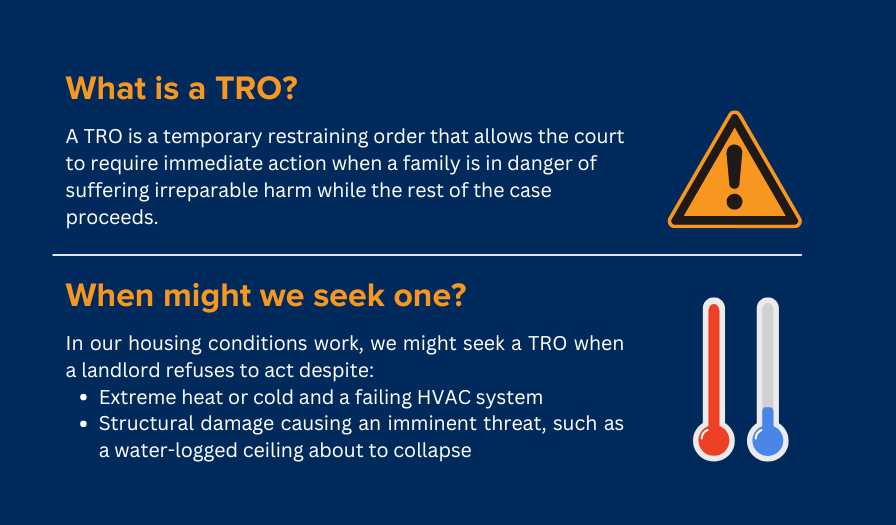Heat waves bring on a health crisis

This summer’s record-breaking heat is a dangerous health threat for DC families, especially when they struggle for weeks or months with broken air conditioning.
Ms. Torres* has worked with Children’s Law Center for years advocating to keep her son Nic healthy: he has epilepsy, and heat exhaustion can trigger his seizures. Her two youngest children also have asthma exacerbated by mold, stale air and the heat.
They’ve had AC issues since first moving into their home – but in June, the thermostat regularly spiked to the upper 80s. According to Nic’s doctor, his bedroom shouldn’t be above 70 degrees to minimize seizures. But the family’s landlord has delayed making repairs for years.
A few miles away, Ms. Davis faced similar issues with their building’s HVAC system. At 5 months pregnant, she was already suffering from hyperemesis gravidarum – which caused nausea, vomiting and severe dehydration. Then her AC broke.
The heat made things much worse for her as well as for her husband and son who have asthma. She ended up hospitalized for dehydration after temperatures in their house reached over 100 degrees. The landlord still refused to act.
Changing Temperatures Change our Legal Strategies
When we can’t resolve issues directly with landlords, we turn to DC’s Housing Conditions Court to hold them accountable for housing code violations. While it’s a great strategy for long-term repairs, we sometimes need to turn to another tool in our toolkit when intense heat poses an acute threat to children and families: filing for temporary restraining orders (TROs) which can be used to force immediate action through DC Superior Court.
From a health standpoint, we are concerned that increased heat often is a trigger for asthma. Having a home that minimizes asthma symptoms is very important. If a housing unit has an AC unit, it is imperative that it is working correctly.
Dr. Jessica Nash, Associate Medical Director at Children’s National Anacostia Clinic

We successfully sought TROs for both Ms. Torres and Ms. Davis. One landlord was forced to install a window unit to bring down the temperature within 24 hours and the other had to cover the family staying in a hotel until repairs brought the thermostat back down to a normal range.
Today, we’re continuing to work with Ms. Torres and Ms. Davis to address persisting housing issues that impact their children’s health. We are thankful we could use TROs to provide their families with some instant relief, and we will continue to use our full suite of legal tools to keep children and families healthy and out of the hospital.
Ms. Torres’ and Ms. Davis’ Advocacy
Heat Exhaustion Triggers Nic’s Seizures
Ms. Torres has worked with Children’s Law Center for years advocating for her son Nic’s health and educational needs: he is autistic and has epilepsy. Heat exhaustion can trigger his seizures. Her two youngest children also have asthma exacerbated by mold, stale air and the heat.
They’ve had problems with the AC since they moved in – even when it is working enough to send out cold air, it’s not circulating through the rest of the duplex, poorly constructed windows let in the heat and temperatures inside regularly reached the upper 80s. According to Nic’s doctor, his bedroom shouldn’t be above 70 degrees in order to minimize seizures.
The landlords have dragged their feet on repairs for years.
I care about my kids being able to breathe. [The landlords] don’t have to live here, they don’t care.
Ms. Torres
We were able to get the landlord to replace a number of windows this year as part of the standard litigation process. But during the first of multiple, back-to-back heat waves this summer, temperatures kept increasing inside and we filed for a TRO. The judge quickly ordered the landlord to act within 24 hours, and they installed a window unit to bring the temperature down.
It was a small victory in a longer battle. While we continue to try to get the central air system fixed, Ms. Torres has to keep the unit and box fans running at full-blast to get the temperature closer to a healthy level, leading to skyrocketing electricity bills.
A Broken HVAC System Sent Her to the Hospital
When Ms. Davis was five months pregnant last summer, her family’s air conditioning stopped working… again. She was suffering from hyperemesis gravidarum – which caused nausea, vomiting and severe dehydration – and the heat made things much worse for her as well as for her husband and son who have asthma.
Temperatures kept rising over the summer and the AC was blowing warm air – at one point, it reached 104 degrees inside.
I was hospitalized for four days over the 4th of July. Every room was blasting heat.
Ms. Davis
She was referred to Children’s Law Center, and together we sought a TRO to force immediate action. The landlord’s attempted fixes just for the devices in her unit didn’t work, and the court ordered them to pay for her family to stay in a hotel for two weeks while they replaced the HVAC for the whole building.
Thankfully, that brought the temperature back down to healthier levels during the remainder of her pregnancy. But other conditions in the unit have continued to deteriorate, and we’re working together to help Ms. Davis secure healthy housing for her and her family.
It’s Time for Healthier and Safer Housing for all DC Residents
When a child lives in unhealthy housing, they are more likely to end up in the ER because their poor housing conditions trigger health issues like asthma. That’s why Children’s Law Center partners with organizations across the city to advocate for healthier housing so that all DC children have the safe housing they need to live healthy lives.